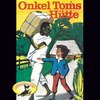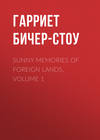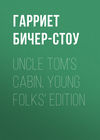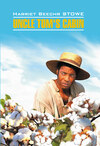Buch lesen: «Sam Lawson's Oldtown Fireside Stories», Seite 7
COLONEL EPH’S SHOE-BUCKLES
“YES, this ‘ere’s Tekawampait’s grave,” said Sam Lawson, sitting leisurely down on an ancient grass-grown mound, ornamented by a mossy black slate-stone slab, with a rudely-carved cherub head and wings on top.
“And who was Tekawampait?”
“I wanter know, now, if your granny hain’t told you who Tekawampait was?” said Sam, pushing back his torn straw hat, and leaning against the old slanting gravestone.
“No, she never told us.”
“Wal, ye see, Tekawampait he was the fust Christian Indian minister o’ the gospel there was in Old-town. He was a full-blooded Indian, but he was as good a Christian as there was goin’; and he was settled here over the church in Oldtown afore Parson Peabody; and Parson Peabody he come afore Parson Lothrop; and a very good minister Teka-wampait was too. Folks hes said that there couldn’t nothin’ be made o’ Indians; that they was nothin’ but sort o’ bears and tigers a walkin’ round on their hind legs, a seekin’ whom they might devour; but Parson Eliot he didn’t think so. ‘Christ died for them as wal as for me,’ says he; ‘and jest give ‘em the gospel,’ says he, ‘and the rest ‘ll come along o’ itself.’ And so he come here to Oldtown, and sot up a sort o’ log-hut right on the spot where the old Cap’n Brown house is now. Them two great elm-trees that’s a grown now each side o’ the front gate was two little switches then, that two Indians brought up over their shoulders, and planted there for friendship trees, as they called ‘em; and now look what trees they be! He used to stand under that ‘are big oak there, and preach to the Indians, long before there was any meetin’-house to speak in here in Oldtown.
“Wal, now, I tell you, it took putty good courage in Parson Eliot to do that ‘are. I tell you, in them days it took putty consid’able faith to see any thing in an Indian but jest a wild beast. Folks can’t tell by seein’ on ‘em now days what they was in the old times when all the settlements was new, and the Indians was stark, starin’ wild, a ravin’ and tarin’ round in the woods, and a fightin’ each other and a fightin’ the white folks. Lordy massy! the stories I’ve heard women tell in their chimbley-corners about the things that used to happen when they was little was enough to scare the very life out o’ ye.”
“Oh, do, do tell us some of them!” said Henry and I.
“Lordy massy, boys: why, ye wouldn’t sleep for a week. Why, ye don’t know. Why, the Indians in them days wa’n’t like no critter ye ever did see. They was jest the horridest, paintedest, screeehinest, cussedest critters you ever heard on. They was jest as artful as sarpents, and crueller than any tigers. Good Dr. Cotton Mather calls ‘em divils, and he was a meek, good man, Dr. Cotton was; but they cut up so in his days, it’s no wonder he thought they was divils, and not folks. Why, they kep’ the whole country in a broil for years and years. Nobody knowed when they was safe; for they were so sly and cunnin’, and always watchin’ behind fences and bushes, and ready when a body was a least thinkin’ on’t to be down on ‘em. I’ve heard Abiel Jones tell how his father’s house was burnt down at the time the Indians burnt Deerfield. About every house in the settlement was burnt to the ground; and then another time they burnt thirty-two houses in Springfield, – the minister’s house and all, with all his library (and books was sca’ce in them days); but the Indians made a clean sweep on’t. They burnt all the houses in Wendham down to the ground; and they came down in Lancaster, and burnt ever so many houses, and carried off forty or fifty people with ‘em into the woods.
“There was Mr. Rolandson, the minister, they burnt his house, and carried off Mis’ Rolandson and all the children. There was Jerushy Pierce used to work in his family and do washin’ and chores, she’s told me about it. Jerushy she was away to her uncle’s that night, so she wa’n’t took. Ye see, the Lancaster folks had been afeard the Indians’d be down on ‘em, and so Parson Rolandson he’d gone on to Boston to get help for ‘em; and when he come back the mischief was all done. Jerushy said in all her life she never see nothin’ so pitiful as that ‘are poor man’s face when she met him, jest as he come to the place where the house stood. At fust he didn’t say a word, she said, but he looked kind o’ dazed. Then he sort o’ put his hand to his forehead, and says he, ‘My God, my God, help me!’ Then he tried to ask her about it, but he couldn’t but jest speak. ‘Jerushy,’ says he, ‘can’t you tell me, – where be they?’ ‘Wal,’ says Jerushy, ‘they’ve been carried off.’ And with that he fell right down and moaned and groaned. ‘Oh!’ says he, I’d rather heard that they were at peace with the Lord.’ And then he’d wring his hands: ‘What shall I do? What shall I do?’
“Wal, ‘twa’n’t long after this that the Indians was down on Medford, and burnt half the houses in town, and killed fifty or sixty people there. Then they came down on Northampton, but got driv’ back; but then they burnt up five houses, and killed four or five of the folks afore they got the better of ‘em there. Then they burnt all the houses in Groton, meetin’-house and all; and the pisen critters they hollared and triumphed over the people, and called out to ‘em, ‘What will you do for a house to pray in now? we’ve burnt your meetin’-house.’ The fightin’ was goin’ on all over the country at the same time. The Indians set Marlborough afire, and it was all blazin’ at once, the same day that some others of ‘em was down on Springfield, and the same day Cap’n Pierce, with forty-nine white men and twenty-six Christian Indians, got drawn into an ambush, and every one of ‘em killed. Then a few days after this they burnt forty houses at Rehoboth, and a little while after they burnt thirty more at Providence. And then when good Cap’n Wadsworth went with seventy men to help the people in Sudbury, the Indians came pourin’ round ‘em in the woods like so many wolves, and killed all but four or five on ‘em; and those poor fellows had better hev been killed, for the cruel critters jest tormented ‘em to death, and mocked and jeered at their screeches and screams like so many divils. Then they went and broke loose on Andover; and they was so cruel they couldn’t even let the dumb critters alone. They cut out the tongues of oxen and cows, and left ‘em bleedin’, and some they fastened up in barns and burnt alive. There wa’n’t no sort o’ diviltry they wa’n’t up to. Why, it got to be so in them days that folks couldn’t go to bed in peace without startin’ every time they turned over for fear o’ the Indians. Ef they heard a noise in the night, or ef the wind squealed and howled, as the wind will, they’d think sure enough there was that horrid yell a comin’ down chimbley.
“There was Delily Severence; she says to me, speakin’ about them times, says she, ‘Why, Mr. Lawson, you’ve no idee! Why, that ‘are screech,’ says she, ‘wa’n’t like no other noise in heaven above, or earth beneath, or water under the earth,’ says she. ‘When it started ye out o’ bed between two or three o’clock in the mornin’, and all your children a cryin’, and the Indians a screechin’ and yellin’ and a tossin’ up firebrands, fust at one window and then at another, why,’ says she, ‘Mr. Lawson, it was more like hell upon earth than any thing I ever heard on.’
“Ye see, they come down on Delily’s house when she was but jest up arter her third baby. That ‘are woman hed a handsome head o’ hair as ever ye see, black as a crow’s wing; and it turned jest as white as a table-cloth, with nothin’ but the fright o’ that night.”
“What did they do with her?”
“Oh! they took her and her poor little gal and boy, that wa’n’t no older than you be, and went off with ‘em to Canada. The troubles them poor critters went through! Her husband he was away that night; and well he was, else they’d a tied him to a tree and stuck pine slivers into him and sot ‘em afire, and cut gret pieces out’o his flesh, and filled the places with hot coals and ashes, and all sich kind o’ things they did to them men prisoners, when they catched ‘em. Delily was thankful enough he was away; but they took her and the children off through the ice and snow, jest half clothed and shiverin’; and when her baby cried and worried, as it nat’rally would, the old Indian jest took it by its heels, and dashed its brains out agin a tree, and threw it into the crotch of a tree, and left it dangling there; and then they would mock and laugh at her, and mimic her baby’s crying, and try every way they could to aggravate her. They used to beat and torment her children right before her eyes, and pull their hair out, and make believe that they was goin’ to burn ‘em alive, jest for nothin’ but to frighten and worry her.”
“I wonder,” said I, “she ever got back alive.”
“Wal, the wimmen in them times hed a sight o’ wear in ‘em. They was resolute, strong, hard-workin’ wimmen. They could all tackle a hoss, or load and fire a gun. They was brought up hard, and they was used to troubles and dangers. It’s jest as folks gets used to things how they takes ‘em. In them days folks was brought up to spect trouble; they didn’t look for no less. Why, in them days the men allers took their guns into the field when they went to hoe corn, and took their guns with ‘em to meetin’ Sundays; and the wimmen they kep’ a gun loaded where they knew where to find it; and when trouble come it was jest what they spected, and they was put even with it. That’s the sort o’ wimmen they was. Wal, Delily and her children was brought safe through at last, but they hed a hard time on’t.”
“Tell us some more stories about Indians, Sam,” we said, with the usual hungry impatience of boys for a story.
“Wal, let me see,” said Sam, with his hat pushed back and his eyes fixed dreamily on the top of Eliot’s oak, which was now yellow with the sunset glory, – “let me see. I hain’t never told ye about Col. Eph Miller, hev I?”
“No, indeed. What about him?”
“Wal, he was took prisoner by the Indians; and they was goin’ to roast him alive arter their fashion, and he gin ‘em the slip.”
“Do tell us all about it.”
“Wal, you see, Deliverance Scranton over to Sherburne, she’s Col. Eph’s daughter; and she used to hear her father tell about that, and she’s told me time and agin about it. It was this way, – You see, there hedn’t ben no alarm about Indians for some time, and folks hed got to feelin’ kind o’ easy, as folks will. When there don’t nothin’ happen for a good while, and it keeps a goin’ on so, why, you think finally there won’t nothin’ happen; and so it was with Col. Eph and his wife. She told Deliverance that the day before she reely hed forgot all about that there was any Indians in the country; and she’d been out after spruce and wintergreen and hemlock, and got over her brass kettle to bile for beer; and the child’n they brought in lots o’ wild grapes that they gathered out in the woods; and they said when they came home that they thought they see an Indian a lyin’ all along squirmin’ through the bushes, and peekin’ out at ‘em like a snake, but they wa’n’t quite sure. Faith, the oldest gal, she was sure she see him quite plain; but ‘Bijah (he was Col. Eph’s oldest boy) he wa’n’t so sure.
“Anyway, they didn’t think no more about it, and that night they hed prayers and went off to bed.
“Arterwards, Col. Eph he said he remembered the passage o’ Scriptur’ he read that night; it was, ‘The race is not to the swift nor the battle to the strong.’ He didn’t notice it much when he read it; but he allers spoke of it arterwards as a remarkable providence that that ‘are passage should have come jest so that night.
“Wal, atween twelve and one o’clock they was waked up by the most awful screechin’ that ever you heard, as if twenty thousand devils was upon ‘em. Mis’ Miller she was out o’ bed in a minit, all standin’. ‘O husband, husband, the Indians are on us!’ says she; and sure enough they was. The children, ‘Bijah and Faith come a runnin’ in. ‘O father, father! what shall we do?’
“Col. Eph was a man that allers knew in a minit what to do, and he kep’ quite cool. ‘My dear,’ says he to his wife, ‘you take the children, and jest run with ‘em right out the buttery-door through the high corn, and run as fast as you can over to your father Stebbins’, and tell him to rouse the town; and Bije,’ says he to the boy, ‘you jest get into the belfry window, and ring the bell with all your might,’ says he. ‘And I ‘ll stay and fight ‘em off till the folks come.’
“All this while the Indians was a yellin’ and screechin’ and a wavin’ fire-brands front of the house. Col. Eph he stood a lookin’ through a hole in the shutter and a sightin’ his gun while he was a talkin’. He see that they’d been a pilin’ up a great pile o’ dry wood agin the door. But the fust Indian that came up to put fire to’t was shot right down while he was a speakin’.
“Wal, Mis’ Miller and Faith and Bije wa’n’t long a dressin’, you may believe; and they jest put on dark cloaks, and they jest streaked it out through the buttery-door! There was thick pole-beans quite up to the buttery-door, and then a field o’ high corn, so that they was hid, and the way they run wasn’t slow, I tell you.
“But Col. Eph he hed to stop so to load that they got the pile o’ brush afire, though he shot down three or four on ‘em, and that was some comfort. But the long and the short o’ the matter was, that they driv the door in at last, and came a whoopin’ and yellin’ into the house.
“Wal, they took Col. Eph, and then went search-in’ round to find somebody else; but jest then the meetin’-house bell begun to ring, and that scart ‘em, and they took Col. Eph and made off with him. He hedn’t but jest time to get into his clothes and get his shoes on, when they hurried him off. They didn’t do nothin’ to him jest then, you see, these Indians was so cur’ous. If a man made a good fight, and killed three or four on ‘em afore they could take him, they sot great store by him, and called him a brave man. And so they was ‘mazin’ careful of Col. Eph, and treated him quite polite for Indians; but he knew the ways on ‘em well enough to know what it was all for. They wanted a real brave man to burn alive and stick slivers into and torment, and Col. Eph was jest the pattern for ‘em, and his fight-in’ so brave made him all the better for what they wanted.
“Wal, he was in hopes the town would be roused in time for some of ‘em to come arter him; but the Indians got the start of ‘em, and got ‘way off in the woods afore people hed fairly come together and found out what the matter was. There was Col. Eph’s house a blazin’ and a lightin’ up all the country for miles round; and the colonel he said it come ruther hard on him to be lighted on his way through the woods by such a bonfire.
“Wal, by mornin’ they come to one o’ their camps, and there they hed a great rejoicin’ over him. They was going to hev a great feast, and a good time a burnin’ on him; and they tied him to a tree, and sot an Indian to watch him while they went out to cut pine knots and slivers to do him with.
“Wal, as I said, Col. Eph was a brave man, and a man that always kep’ his thoughts about him; and so he kep’ a workin’ and a workin’ with the withs that was round his hands, and a prayin’ in his heart to the Lord, till he got his right hand free. Wal, he didn’t make no move, but kep’ a loosenin’ and a loosenin’ little by little, keepin’ his eye on the Indian who sot there on the ground by him.
“Now, Col. Eph hed slipped his feet into his Sunday shoes that stood there by the bed and hed great silver shoe-buckles; and there was a providence in his doin’ so, for, ye see, Indians are ‘mazin’ fond o’ shiny things.
“And the old Indian he was took with the shine o’ these shoe-buckles, and he thought he might as well hev ‘em as anybody; so he jest laid down his tommyhawk, and got down on his knees, and was workin’ away as earnest as could be to get off the buckles, and Col. Eph he jest made a dart forward and picked up the tommyhawk, and split open the Indian’s skull with one blow: then he cut the withs that was round his legs, and in a minute he was off on the run with the tommyhawk in his hand. There was three Indians give chase to him, but Col. Eph he kep’ ahead of ‘em. He said while he was a runnin’ he was cryin,’ and callin’ on the Lord with all his might, and the words come into his mind he read at prayers the night afore, ‘The race is not to the swift, nor the battle to the strong.’
“At last he see the Indians gained on him; and he faced round suddenly, and struck the nighest one smack on the head with his tommyhawk. Then when the next one come up he cut him down too; and the third one, when he see both the others cut down, and Col. Eph comin’ full blaze towards him with his tommyhawk a swingin’, he jest turned and run for dear life. Then Col. Eph he turned and cut for the settlement. He run, and he run, and he run, he didn’t well know how long, till, finally, he was clear tuckered out, and he jest dropped down under a tree and slept; and he lay there all the rest of that day, and all night, and never woke till the next day about sundown.
“Then he woke up, and found he was close by home, and John Stebbins, his wife’s father, and a whole party, was out lookin’ for him.
“Old Col. Eph used to tell the story as long as he lived, and the tears used to run down his cheeks when he told it.
“‘There’s a providence in every thing,’ he used to say, ‘even down to shoe-buckles. Ef my Sunday shoes hadn’t happened to ‘a’ set there so I could ‘a’ slipped into ‘em, I couldn’t ‘a’ killed that Indian, and I shouldn’t ‘a’ been here to-day.’ Wal, boys, he was in the right on’t. Some seem to think the Lord don’t look out only for gret things, but, ye see, little things is kind o’ hinges that gret ones turns on. They say, take care o’ pennies, and dollars ‘ll take care o’ themselves. It’s jest so in every thing; and, ef the Lord don’t look arter little things, he ain’t so gret as they say, anyway.
“Wal, wal,” said Sam in conclusion, “now, who’d ‘a’ thought that anybody could ‘a’ made any thing out o’ Indians? Yet there ‘twas. All them Martha Vineyard Indians turned Christians, and there was Indian preachers and Indian teachers; and they reely did settle down, and get to be quite like folks. But I tell you, boys, it took faith to start with.”
THE BULL-FIGHT
IT was Saturday afternoon, – time of blessed memory to boys, – and we were free for a ramble after huckleberries; and, with our pails in hand, were making the best of our way to a noted spot where that fruit was most abundant.
Sam was with us, his long legs striding over the ground at a rate that kept us on a brisk trot, though he himself was only lounging leisurely, with his usual air of contemplation.
“Look ‘ere, boys,” he suddenly said, pausing and resting his elbow on the top of a rail-fence, “we shall jest hev to go back and go round by Deakin Blodgett’s barn.”
“Why so?” we both burst forth in eager tones.
“Wal, don’t ye see the deakin’s turned in his bull into this ‘ere lot?”
“Who cares?” said I. “I ain’t afraid.”
“Nor I,” said Harry. “Look at him: he looks mild enough: he won’t hurt us.”
“Not as you knows on,” said Sam; “and then, agin, you don’t know, – nobody never knows, what one o’ them ‘ere critters will do: they’s jest the most contrary critters; and ef you think they’re goin’ to do one way they’re sure to do t’other. I could tell ye a story now that’d jest make yer har stan’ on eend.” Of course we wanted to have our hair stand on end, and beset Sam for the story; but he hung off.
“Lordy massy! boys, jest let’s wait till ye’ve got yer huckleberries: yer granny won’t like it ef ye don’t bring her none, and Hepsy she ‘ll be in my har, – what’s left on’t,” said Sam, taking off his old torn hat, and rubbing the loose shock of brash and grizzled hair.
So we turned and made a détour, leaving the bull on the right, though we longed amazingly to have a bout with him, for the fun of the thing, and mentally resolved to try it when our mentor was not round.
It all comes back to me again, – the image of that huckleberry-pasture, interwoven with fragrance of sweet-fern, and the ground under our feet embroidered with star-moss and wintergreen, or foamy patches of mossy frost-work, that crushed and crackled delightfully beneath our feet. Every now and then a tall, straight fire-lily – black, spotted in its centre – rose like a little jet of flame; and we gathered it eagerly, though the fierce August sun wilted it in our hands. The huckleberry-bushes, bending under their purple weight, we gathered in large armfuls, and took them under the shadow of the pine-trees, that we might strip them at our leisure, without being scorched by the intense glare of the sun. Armful after armful we carried and deposited in the shade, and then sat down to the task of picking them off into our pails. It was one of those New-England days hotter than the tropics, Not a breath of air was stirring, not a bird sang a note, not a sound was heard, except the drowsy grating of the locusts.
“Well, now, Sam, now tell us that story about the bull.”
“Lordy massy, how hot ‘tis!” said Sam, lying back, and resting on the roots of a tree, with his hands folded under his head. “I’m all in a drip of sweat.”
“Well, Sam, we ‘ll pick off your berries, if you ‘ll talk.”
“Wall, wall, be kerful yer don’t git no green ones in among ‘em, else Hepsy ‘ll be down on me. She’s drefful partikelar, she is. Every thing has to be jest so. Ef it ain’t, you ‘ll hear on’t. Lordy massy I boys, she’s always telling me I don’t do nothin’ for the support of the family. I leave it to you if I didn’t ketch her a nice mess o’ fish a Tuesday. I tell her folks can’t expect to roll in money, and allers to have every thing jess ‘z they want it. We brought nothin’ into the world with us, and it’s sartain we ken carry nothin’ out; and, having food and raiment, we ought to be content. We have ben better off’n we be now. Why, boys, I’ve seen the time that I’ve spent thirty-seven cents a week for nutmegs; but Hepsy hain’t no gratitude: such folks hez to be brought down. Take care, now, yer ain’t a-putting green ones in; be yer?”
“Sam, we sha’n’t put in any at all, if you don’t tell us that story.”
“Lordy massy! you young ones, there ain’t never no contentin’ yer, ef a fellow was to talk to the millennium. Wonder now if there is going to be any millennium. Wish I’d waited, and been born in them days, ‘spect things would a sorter come along easier. Wall, I shall git through some way, I s’pose.”
“Sam,” said I, sitting back, “we’re putting all our berries into your pail; and, if you don’t begin to tell us a story, we won’t do it.”
“Lordy massy! boys, I’m kind o’ collectin’ my idees. Ye have to talk a while to git a-goin’, everybody does. Wal, about this ‘ere story. Ye ‘member that old brown house, up on the hill there, that we saw when we come round the corner? That ‘are was where old Mump Moss used to live. Old Mump was consid’able of a nice man: he took in Ike Sanders, Mis’ Moss’s sister’s boy, to help him on the farm, and did by him pretty much ez, he did by his own. Bill Moss, Mump’s boy, he was a con-trairy kind o’ critter, and he was allers a-hectorin’ Ike. He was allers puttin’ off the heaviest end of every thing on to him. He’d shirk his work, and git it off on to Ike every way he could. And he allers threw it up at him that he was eatin’ his father’s bread; and he watched every mouthful he ate, as if he hated to see it go down. Wal, ye see, for all that. Ike he growed up tall and strong, and a real handsome young feller; and everybody liked him. And Bill he was so gritty and contrairy, that his own mother and sisters couldn’t stan’ him; and he was allers a-flingin’ it up at ‘em that they liked Ike more’n they did him. Finally his mother she said to him one day, ‘Why shouldn’t I,’ sez she, ‘when Ike’s allers pleasant to me, and doin’ every thing he ken fur me, and you don’t do nothin’ but scold.’ That ‘are, you see, was a kind o’ home-thrust, and Bill he didn’t like Ike a bit the better for that. He did every thing he could to plague him, and hector him, and sarcumvent him, and set people agin him.
“Wal, ye see, ‘twas the old story about Jacob and Laban over agin. Every thing that Ike put his hand to kind o’ prospered. Everybody liked him, everybody hed a good word for him, everybody helped grease his wheels. Wal, come time when he was twenty-one, old Mump he gin him a settin’ out. He gin him a freedom suit o’ clothes, and he gin him a good cow, and Mis’ Moss she knit him up a lot o’ stockings, and the gals they made him up his shirts. Then, Ike he got a place with Squire Wells, and got good wages; and he bought a little bit o’ land, with a house on it, on Squire Wells’s place, and took a mortgage on’t, to work off. He used to work his own land, late at night and early in the mornin’, over and above givin’ good days’ works to the squire; and the old squire he sot all the world by him, and said he hedn’t hed sich a man to work since he didn’t know when.
“Wal, a body might ha’ thought that when Bill had a got him out o’ the house, he might ha’ ben satisfied, but he wasn’t. He was an ugly fellow, Bill Moss was; and a body would ha’ thought that every thing good that happened to Ike was jest so much took from him. Come to be young men, growed up together, and waitin’ on the gals round, Ike he was pretty apt to cut Bill out. Yer see, though Bill was goin’ to have the farm, and all old Mump’s money, he warn’t pleasant-spoken; and so, when the gals got a chance, they’d allers rather go with Ike than him. Finally, there was Delily Sawin, she was about the handsomest girl there was round, and she hed all the fellers arter her; and her way was to speak ‘em all fair, and keep ‘em all sort o’ waitin’ and hopin’, till she got ready to make her mind up. She’d entertain Bill Saturday night, and she’d tell Ike he might come Sunday night; and so Ike he was well pleased, and Bill he growled.
“Wal, there come along a gret cattle-show. Squire Wells he got it up: it was to be the gretest kind of a time, and Squire Wells he give money fur prizes. There was to be a prize on the best cow, and the best bull, and the best ox, and the best horse, and the biggest punkins and squashes and beets, and there was a prize for the best loaf o’ bread, and the best pair o’ stockin’s, and the handsomest bed-quilt, and the rest o’ women’s work. Wal, yer see, there was a gret to-do about the cattle-show; and the wagons they came in from all around, – ten miles; and the gals all dressed up in their best bunnits, and they had a ball in the evenin’. Wal, ye see, it so happened that Bill and Ike each on ‘em sent a bull to the cattle-show; and Ike’s bull took the prize. That put the cap-sheaf on for Bill. He was jest about as much riled as a feller could be; and that evenin’ Delily she danced with Ike twice as many times ez she did with him. Wal, Bill he got it round among the fellers that the jedges hed been partial; and he said, if them bulls was put together, his bull would whip Ike’s all to thunder. Wal, the fellers thought ‘twould be kind o’ fun to try ‘em, and they put Ike up to it. And finally ‘twas agreed that Ike’s bull should be driv over to old Mump’s; and the Monday after the cattle-show, they should let ‘em out into the meadow together and see which was the strongest. So there was a Sunday the bulls they were both put up together in the same barn; and the ‘greement was, they wasn’t to be looked at nor touched till the time come to turn ‘em out.
“Come Sunday mornin’, they got up the wagon to go to meetin’; and Mis’ Moss and the gals and old Mump, they was all ready; and the old yaller dog he was standrn’ waitin’ by the wagon, and Bill warn’t nowhere to be found. So they sent one o’ the girls up chamber to see what’d got him; and there he was a-lyin’ on the bed, and said he’d got a drefful headache, and didn’t think he could go to meetin’. Wal, the second bell was a-tollin’, and they had to drive off without him: they never mistrusted but what ‘twas jest so. Wal, yer see, boys, ‘twas that ‘are kind o’ Sunday headache that sort o’ gets better when the folks is all fairly into meetin’. So, when the wagon was fairly out o’ sight, Bill he thought he’d jest go and have a peek at them bulls. Wal, he looked and he peeked, and finally he thought they looked so sort o’ innocent ‘twouldn’t do no harm to jest let ‘em have a little run in the cow-yard aforehand. He kind o’ wanted to see how they was likely to cut up. Now, ye see, the mischief about bulls is, that a body never knows what they’s goin’ to do, ‘cause whatever notion takes ‘em allers comes into their heads so kind o’ suddin, and it’s jest a word and a blow with ‘em. Wal, fust he let out his bull, and then he went in and let out Ike’s. Wal, the very fust thing that critter did he run up to Bill’s bull, full tilt, and jest gin one rip with his horns right in the side of him, and knocked him over and killed him. Didn’t die right off, but he was done for; and Bill he gin a the old feller turned right round, and come at him. I tell you, Bill he turned and made a straight coattail, rippin’ and peelin’ it towards the house, and the bull tearin’ on right arter him. Into the kitchen he went, and he hedn’t no time to shut the door, and the bull arter him; and into the keepin’-room, and the bull arter him there. And he hedn’t but jest time to git up the chamber-stairs, when he heard the old feller roarin’ and tearin’ round there like all natur. Fust he went to the lookin’-glass, and smashed that all to pieces. Then he histed the table over, and he rattled and smashed the chairs round, and made such a roaring and noise, ye’d ha’ thought there was seven devils there; and in the midst of it Bill he looked out of the window, and see the wagon a-comin’ back; and ‘Lordy massy!’ he thought to himself, ‘the bull ‘ll kill every one on ‘em,’ and he run to the window and yelled and shouted, and they saw him, and thought the house must be afire.




















